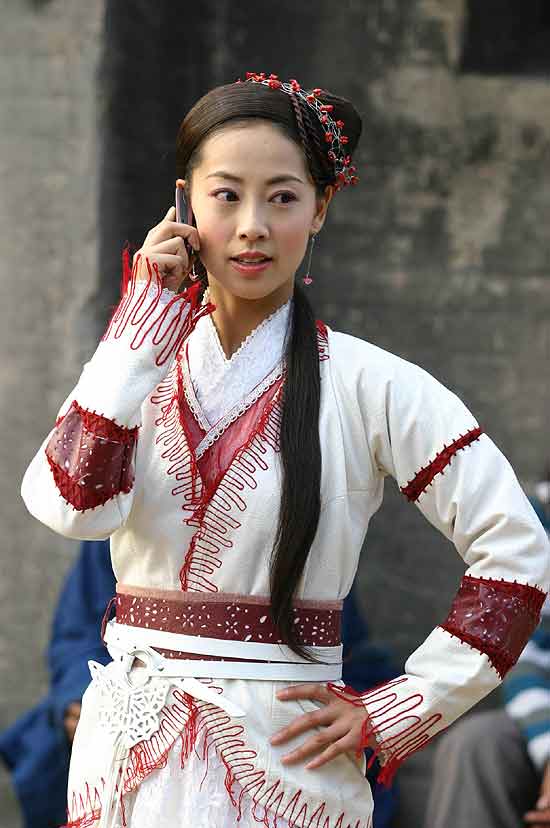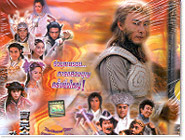The Monkey King: Quest for the Sutra In 2001, Andy Lau's NMG production company produced another television adaptation of Journey to the West. Cheung was given a chance to once again portray the role that made him a household name. The series was broadcast in 2002 on TVB. The Monkey King: Quest for the Sutra Episode 38. 0.0/10 from 0 users. The Monkey King: Quest for the Sutra Episode 39. 0.0/10 from 0 users. The Monkey King: Quest for.

| Tang Sanzang | |
|---|---|
| First appearance | Journey to the West |
| Created by | Wu Cheng'en |
| Based on | Xuanzang |
| Information | |
| Alias | Tripitaka Tang Seng |
| Species | Human |
| Gender | Male |
| Title | Buddha of Sandalwood Merit |
| Occupation | Buddhist monk |
| Affiliation | Sangha |
| Religion | Buddhism |
| Origin | Tang dynasty |
| Nationality | Chinese |
| Tang Sanzang | |||||||||
|---|---|---|---|---|---|---|---|---|---|
The four heroes of Journey to the West, Tang Sanzang on the second from the left, riding on Yulong. Painted decotation in the Long Corridor at the Summer Palace in Beijing, China | |||||||||
| Chinese name | |||||||||
| Chinese | 唐三藏 | ||||||||
| Literal meaning | three collections | ||||||||
| |||||||||
| Xuanzang | |||||||||
| Chinese | 玄奘 | ||||||||
| |||||||||
| Tripitaka | |||||||||
| Traditional Chinese | 三藏經 | ||||||||
| Simplified Chinese | 三藏经 | ||||||||
| |||||||||
| Tang Seng | |||||||||
| Chinese | 唐僧 | ||||||||
| Literal meaning | Tang Monk | ||||||||
| |||||||||
| Japanese name | |||||||||
| Kanji | 玄奘三蔵 | ||||||||
| |||||||||
| Sanskrit name | |||||||||
| Sanskrit | Tripiṭaka | ||||||||
Tang Sanzang, based on the historical Buddhist monk Xuanzang, is a central character in the novel Journey to the West by Wu Cheng'en.
The title Sanzang refers to his mission to seek the Sanzangjing, or the 'Three Collections of (Buddhist) Scriptures'. In some English translations of Journey to the West, the title is rendered as Tripitaka which is the original Sanskrit term for the Sanzangjing. He is also widely known as Tang Seng, which is a courtesy name that, like the former name, Tang Sanzang, reflects his status as an oath brother of Emperor Taizong of the Tang dynasty.
Character description[edit]

In the novel, Tang Sanzang is a Chinese Buddhist monk who had renounced his family to join the Sangha from childhood. He is actually a reincarnation of Golden Cicada (simplified Chinese: 金蝉子; traditional Chinese: 金蟬子; pinyin: Jīn Chánzǐ), a disciple of the Buddha. He is sent on a mission to Tianzhu (an ancient Chinese name for India) to fetch a set of Buddhist scriptures back to China for the purpose of spreading Buddhism in his native land. He becomes sworn brothers with Emperor Taizong of the Tang Dynasty, and the emperor sees him off from the capital Chang'an and orders two escorts to accompany him.
Tang Sanzang is helpless in defending himself and his two escorts are killed during his first encounter with demons after his departure from Chang'an. The bodhisattvaAvalokiteśvara (Guanyin) helps Tang Sanzang find three powerful supernatural beings – Sun Wukong, Zhu Bajie and Sha Wujing – to aid and protect him on his journey. The three become Tang Sanzang's disciples and receive enlightenment and redemption for their past sins once the pilgrimage is complete. Along the journey, Tang Sanzang is constantly terrorised by monsters and demons because of a legend which says that one can attain immortality by consuming his flesh because he is a reincarnation of a holy being.

At the end of the novel, Tang Sanzang is appointed as the Buddha of Sandalwood Merit (Chinese: 旃檀功德佛; pinyin: Zhāntán Gōngdé Fuó).
Historical background[edit]
Tang Sanzang is modeled after the historical Tang DynastyBuddhist monkXuanzang, whose life was the book's inspiration; the real Xuanzang made a perilous journey on foot from China to India (and back) to obtain Buddhist sutras.
In contrast to the historical Xuanzang, a wise and learned scholar (he was in his late 20s when he left for India), the fictional Tang Sanzang is presented as a young monk who is extremely naive, showing idealistic compassion without wisdom. Tang Sanzang is usually quick to fall for the facades of demons who have disguised themselves as innocent humans, whereas Sun Wukong can see through them with his magic powers (specifically fire eyes that can see through the said disguises). This frequently leads to tension when Sun Wukong attacks and kills apparently innocent humans when the demon has in fact simply abandoned the corpse and run away. One such popular instance was when the White Bone Demon (白骨夫人, Chinese: Bai Gu Fu Ren) disguised three times as family members — first, a young woman. After Wukong 'killed' the woman, the demon escaped, but Wukong was punished by Tang Sanzang for it. The second was the young woman's elderly mother, looking for her daughter. The third was the young woman's elderly father, searching for his wife and child. Upon the 'death' of the father by Wukong's hands, Wukong finally killed the demon before she got away. Tang Sanzang, convinced that Wukong had actually killed three innocent people, sent him away, despite protests. Tang Sanzang usually punishes him by chanting the words of the headache spell (緊箍咒) given to Tang Sanzang by the bodhisattvaAvalokiteśvara (Guanyin) to control Wukong, which causes the latter's headband to contract and give him acute headaches.
Like Sun Wukong, Tang Sanzang is often described as a god of protection. Ksitigarbha, a highly revered bodhisattva in East Asian Buddhism, is occasionally mistaken for Tang Sanzang because the former is often portrayed like Tang Sanzang - dressed in a similarly-patterned kasaya, wearing a Buddhist crown, and wielding a khakkhara.
References[edit]
- Bhat, R. B., & Wu, C. (2014). Xuan Zhang's mission to the West with Monkey King. New Delhi : Aditya Prakashan, 2014.
| Wikimedia Commons has media related to Xuanzang in Journey to the West. |